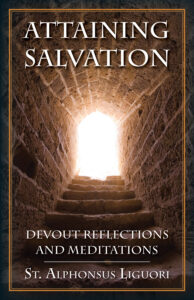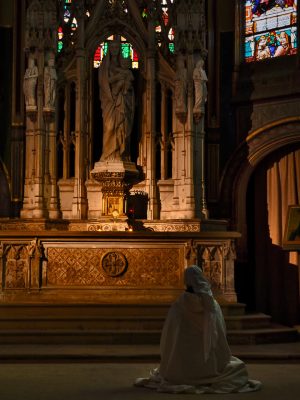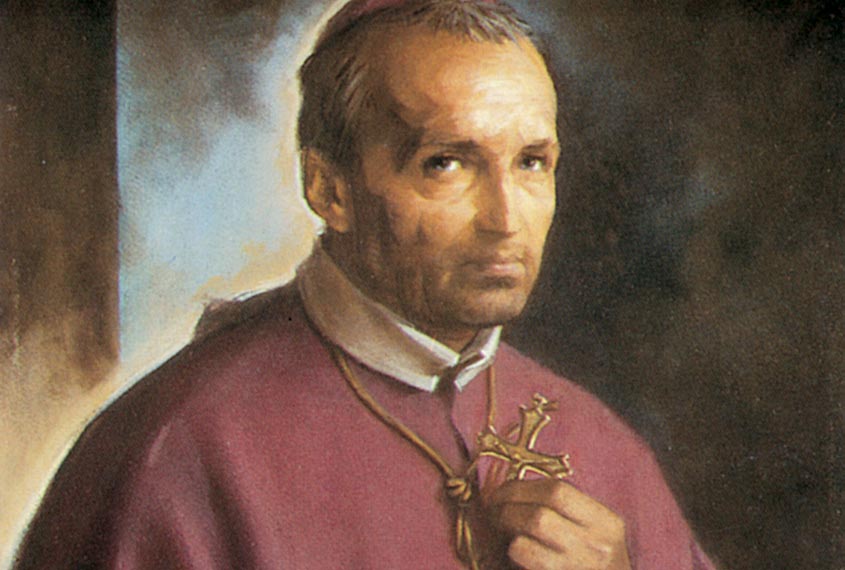GOD does not allow Himself to be found in the tumult of the world; therefore, the Saints were accustomed to seek the most frightful deserts, the most hidden caves, in order that they might flee from men and converse with God alone. St. Hilarion made trial of several deserts, going from one to another, ever seeking the most solitary one, where there should be no man with whom to speak. And in the end, he died in a desert of Cyprus, after having lived there for five years. St. Bruno, when he was called by God to leave the world, went with his companions who wished to follow him, to find St. Hugh, Bishop of Grenoble, that he might assign them some desert place in his diocese. St. Hugh assigned them the Carthusian mountains, which from their frightful wildness, were more fitted to be a resort of wild beasts than a habitation for men; and there they went with joy to dwell, each living in a little hut at a distance from the rest.
Our Lord said once to St. Teresa: “I would willingly speak to many souls, but the world makes so much noise in their hearts that My voice cannot be heard.” God does not speak to us in the midst of the tumult and business of the world, knowing that if He speaks, He is not heard. The words of God are His holy inspirations, His lights and calls, by which the Saints are enlightened and inflamed with divine love; but he who does not love solitude will not be allowed to hear these voices of God.
God Himself declares: “I . . . will lead her into the wilderness, and I will speak to her heart.” (Osee 2:14). When God desires to raise anyone to a high degree of perfection, He induces him to retire to some solitary place, far from the converse of creatures, and there He speaks to the ears—not of the body, but of the heart— and thus He enlightens and inflames him with His divine love.
St. Bernard used to say that he had learned much more of the love of God among the oaks and beeches of the forest than from books and from the servants of God. Therefore, St. Jerome left the pleasures of Rome and shut himself up in the cave of Bethlehem, and afterwards exclaimed: “O solitude, in which God speaks familiarly and converses with His own!” In solitude God converses familiarly with His beloved souls, and there He makes them hear those words which melt their hearts with holy love, as the sacred Spouse said: “My soul melted when he [my Beloved] spoke.” (Canticle of Canticles 5:6).
We see by experience that treating with the world and occupying ourselves in the acquisition of earthly goods makes us forget God; but at the hour of death, what shall we find of all the labor and time we have spent upon the things of earth, except affliction and remorse of conscience? At death we shall find comfort only from that little which we have done and suffered for God. Why, then, do we not detach ourselves from the world before death separates it from us?
Oh, that I had always thought of Thee, O God of my soul, and not of the goods of this world! I curse those days in which, seeking pleasures, I have offended Thee, my Sovereign Good. Oh, that I had always loved Thee! Oh, that I had died and not caused Thee displeasure! Miserable that I am, death draws near while I find myself still attached to the world! No, my Jesus, this day I resolve to leave all and to be entirely Thine. Thou art almighty, Thou hast to give me strength to be faithful to Thee.
O Mother of God, pray to Jesus for me!
This article is taken from a chapter in Attaining Salvation: Devout Reflections and Meditations by St. Alphonsus Liguori which is available from TAN Books.









